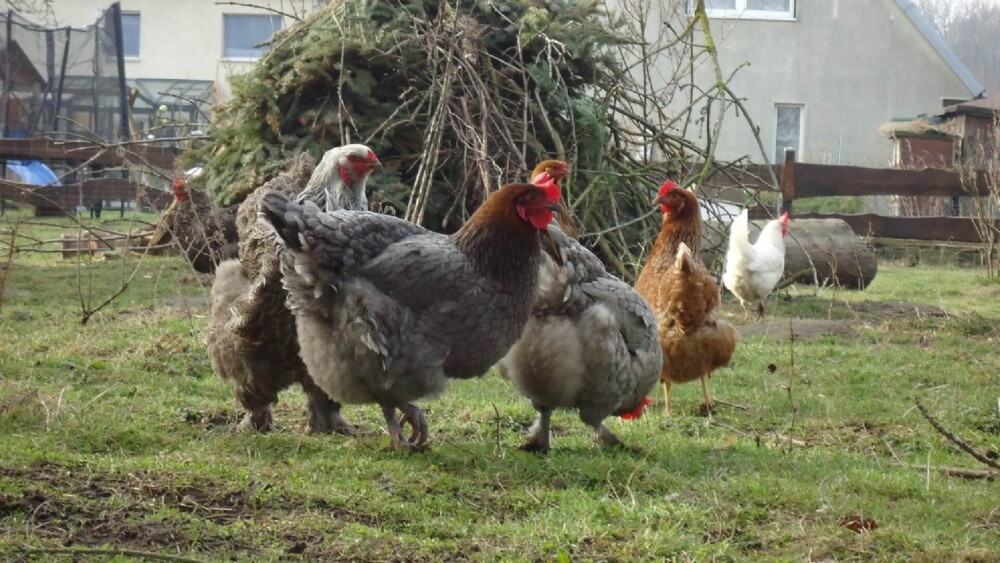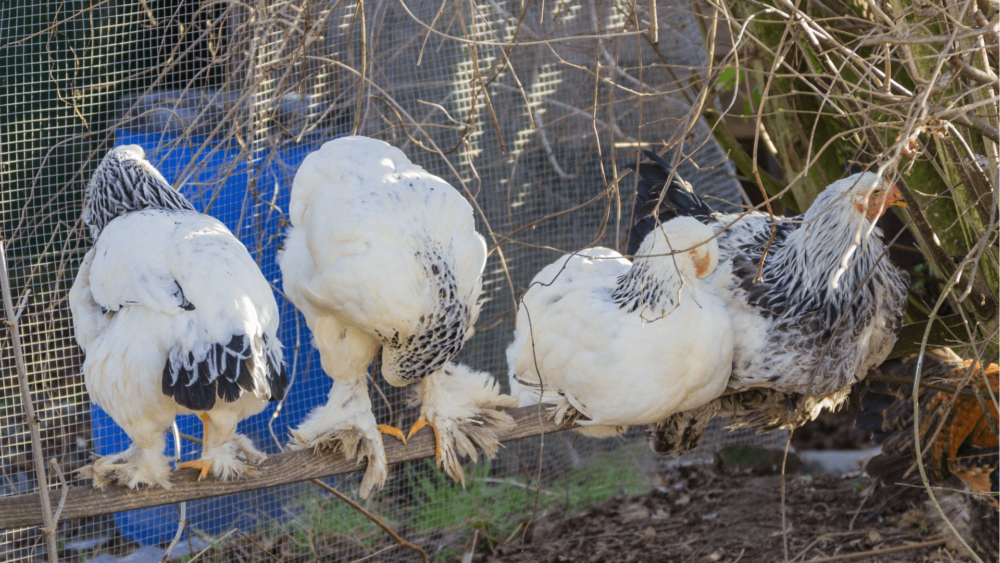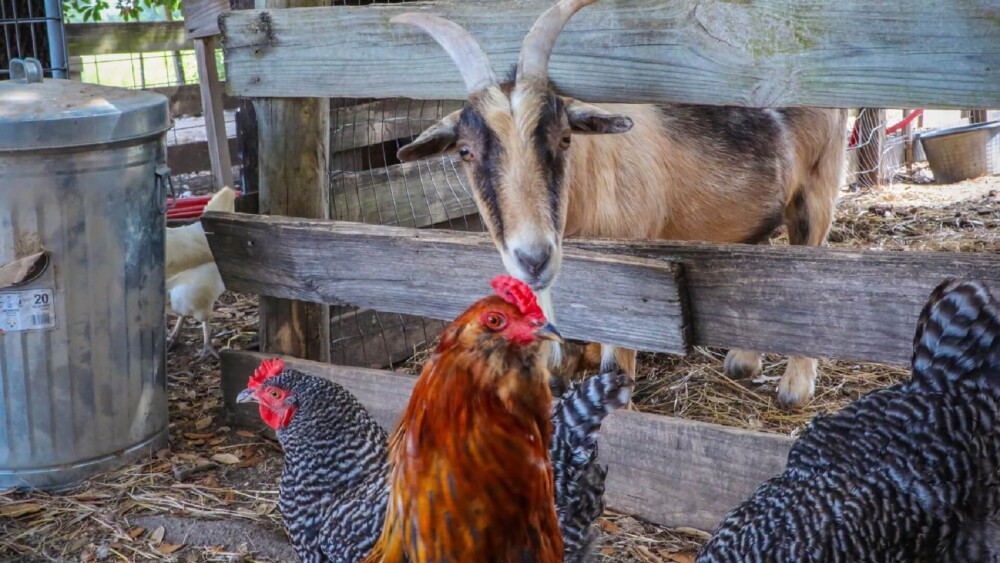Salmonella is something we’re all familiar with. More commonly known as food poisoning, it can affect almost all warm-blooded animals, including chickens. Let’s take a look at everything you need to know about backyard chickens and salmonella.
What is Salmonella? Salmonella is a type of bacteria discovered in 1880. There are two types of Salmonella and many subtypes. Many of them can make infected animals sick. There are also invasive and non-invasive types, meaning that they can infect one part of the body or invade the entire body.
The non-invasive types are far more common in the western world and result in what is commonly known as food poisoning. The invasive kind is very rare in the western world and is more often seen in developing countries. It can spread around the body, and without treatment, can lead to septic shock and death.
How Chickens Get Salmonella
Salmonella is most commonly spread to chickens through rat or mouse droppings. This happens when droppings contaminate chickens’ water, feed, soil, or bedding.
Because chickens forage in the dirt, Salmonella is easily passed around. When swallowed, the bacteria infect the gastrointestinal tract. It can also be passed down to chicks through their mothers.
Is Salmonella Dangerous to Chickens? If left untreated, Salmonella can kill chickens. If your chicken dies when they’re sick with Salmonella, their meat will also be contaminated and will infect anyone who eats it (if it’s not cooked correctly.)
It’s also worth mentioning that some strains of salmonella that affect humans don’t affect chickens, but they can still carry the bacteria, pass it on, and make contaminated products.
Salmonella in Backyard Chickens
Salmonella is more widespread than many people realize. According to research conducted by the Centers for Disease and Control Prevention, around 1 in every 25 packages of farmed chicken and eggs at the grocery store are contaminated with Salmonella.
As further reported by a UK government survey conducted in 2003, the contamination of fresh chicken at 4% is significantly lower than frozen chicken at 10.4%, but there was no difference in the frequency of contamination between whole and portioned chicken.
Less is known about the commonness of Salmonella in pet or backyard chickens. Recent outbreaks, in 2021, tracked by the CDC indicate that two outbreaks were caused by contact with backyard chickens.
But, it is thought to be a lesser concern, as personal facilities are likely to be cleaner and better cared for than industrial ones, and therefore less likely to attract mice and rats. That said, it can happen, but out of the 1.2 million reported salmonella cases every year in the USA, only 212 of them are linked to live poultry.
Symptoms of Salmonella in Chickens
When chickens consume something contaminated with salmonella, the bacteria infect their gastrointestinal tract. This causes weakness, lethargy, purple combs and wattles, a decrease in appetite, and an increase in thirst. They may also have white, yellow, or green diarrhea, and swollen joints and eyes, as well as a dramatic reduction in egg-laying.
However, all of the following symptoms can be mistaken for other conditions, so it’s important to get an official diagnosis from a vet before taking action.
The most common symptoms of Salmonella in Hens are:
- Lethargy
- Purple combs and wattles
- Decreased appetite
- Increased thirst
- Diarrhea: white, yellow, or green
- Swollen joints
- Reduced egg production
Diagnosing Salmonella in Chickens
To diagnose Salmonella in live chickens, you should take samples of their food, water, or litter with sterile cotton swabs and get it tested by a vet. Swabs can also be used to check breeder nests, laying cages, and hatchery machines.
Lab detection techniques range from enzyme immunoassay antigen capture assays and DNA probes to immunofluorescence. Your vet will do whichever one seems most appropriate.
To test for Salmonella in chicken meat, there are several modern, rapid detection testing kits that are available to order straight to your home online. Once you receive it, you can take a sample of the meat as directed on the kit’s instructions and send it back to the company’s lab. Most can show results within 48 hours or less and some even send them straight through to your phone via an app, but it can be expensive.
There are also kits that use more traditional methods like culturing onto selective agar media and incubating the sample at 37°C for 18-24 hours. These kits typically take 3-5 days to gather results from, but are less expensive and have a long, tried, and tested history.
It’s important to realize that Salmonella is killed with thorough cooking. It is one reason that undercooked chicken is not recommended and raw cookie dough can make a consumer ill.
- Vets can test for salmonella
- Meat chickens can be rapidly tested
- Salmonella is killed when meat is thoroughly cooked.
Treating Salmonella in Chickens
There are several steps you should take if you suspect Salmonella in one of your birds. First, isolate the affected bird from the flock in a safe, comfortable, warm location. You should avoid anything that may cause them stress and provide plenty of water and fermented food supplemented with pre and probiotics.
Pre and probiotics promote good gut bacteria. Salmonella is a major disruptor to gut health during a case of salmonella, and probiotics will help to get your chicken’s stomach back to normal.
Salmonella should go away after a few days to a week with conservative treatment. But, depending on the severity of your chicken’s infection, your vet may also prescribe antibiotics to help clear it up.
Research also suggests that thyme, turmeric, and ashwagandha are beneficial in recovery. They can all be mixed in with daily feeds, which should contain 0.1% turmeric, 0.5% ashwagandha, and 5 mg of dried thyme extract per day until full recovery.
Take these steps if your backyard chickens have Salmonella
- Isolate infected birds
- Clean and frequently change water and food
- Rotating chickens to a new pasture can help reduce the spread
- Probiotics can help hens fight Salmonella
- Some herbs help hen’s immune systems and can help combat Salmonella naturally. (Thyme, Turmeric, Ashwagandha)
Preventing Salmonella in Your Flock
Taking preventative measures will help keep your flock safer from Salmonella and many other diseases. Keep their living space secure and clean. Because mice and rats pass Salmonella to hens, put a fence up around it to discourage mice and rats from entering, and clean and refresh it regularly to keep it sanitary.
Keep food in containers that discourage mice. Unused food should be kept locked and not kept in the bag where rodents can find it. You can also use chicken containers that discourage rodent theft and will help to not attract additional rodents to the area.
You should also separate the supplies used for your chicken coop from anything else to avoid cross-contamination, and clean it after you use it.
If you’re buying chicks for the first time, be sure to buy from a reputable farmer to avoid getting sick chicks. You can also vaccinate your chickens against salmonella in some states. Check out this guide on Chicken Vaccines.
How To Clean Your Chicken Coop
Maintaining a clean coop will save you much heartache and stress because it will keep your flock much healthier. To clean a chicken coop, buy an all-natural commercial coop cleaner online or at a farm store, or make your own using a 50/50 mix of water and white vinegar. Vinegar is one of nature’s best cleaners; it’s safe, colorless, chemical-less, and effectively disinfects and deodorizes.
To clean the coop, remove all of the dirt, droppings, debris, feathers, and nesting materials. Spray it down with water using a hose, and then spray the coup with the cleaning solution.
Use a scrubbing brush or broom to scrub the walls and floor and rinse it again when you think it’s clean. Be sure to wear disposable over-the-shoe covers (found on Amazon), as well as a mask and gloves, and sweep out any standing water afterward. Finally, let the coup air dry to dissipate the vinegar smell, preferably in the sun, and put in some fresh bedding.
How Frequently Should I Clean a Chicken Coup?
There’s no universal rule on how often you should clean your chicken coop. And, it depends on whether you use the deep litter method. Some chicken farmers do it weekly, some do it monthly, others do it every couple of months. How often you choose to clean yours may depend on the size of your flock; larger flocks will need more regular cleaning.
However, you should be collecting eggs and changing your chickens’ food and water every day, as well as clearing out any droppings that have been left throughout the day. You should also clean the feeders and waterers and dust the corners to remove cobwebs once a week, and check it over a few times a year for general wear and tear.
Can Cleaning a Chicken Coop Make Me Sick?
Cleaning out a chicken coop can make you sick if you don’t protect yourself. If you go inside without wearing protective clothing, you run the risk of coming into contact with a contaminant and getting infected.
So, when cleaning out a chicken coup, be sure to wear a pair of gloves, as well as some disposable foot coverings, and wash your hands thoroughly afterward.
Dust in the chicken coup is also a cause for concern. According to a recent report published by the National Agricultural Safety Database, chicken coop dust, although organic and once thought to be nothing more than a nuisance, is now known to cause substantial harm to the lungs over time and even cause permanent breathing problems.
The dust from chicken coops also contains endotoxins, which are inflammatory toxins of gram-negative bacteria. They can cause a fever which has similar symptoms to flu; headaches, nausea, coughs, stuffy or runny noses, chest tightness, and phlegm.
So, it’s best to wear respiratory protection such as a dust mask and try to clean the coop when the dust levels are lower. Some factors that affect dust concentrations include the age of your chickens and their litters, their activities, and the temperature.
The age and activity of your flock are fairly out of your control, but you should try to clean the coop in warmer weather or the warmest times of day, (between 12 – 4 pm), as this is when the ventilation levels are the highest.
Contagiousness of Salmonella in Chickens
Salmonella is very contagious in chickens. It can spread amongst the flock, to other animals and pets, and even to humans, very easily. Thankfully, it’s not airborne. You must come into contact with a contaminant to get infected. Usually, it’s from touching a contaminant and then touching your mouth.
So, take proper precautions. Wash your hands thoroughly after coming into contact with your chickens, or with anything related to them. Then, you should be able to protect yourself. Similarly, you shouldn’t let your children or your pets go into the chicken coop, and don’t get too cuddly with them, even if they’re your pets!
When it comes to eating contaminated chicken meat, Salmonella is highly contagious.
The incubation period ranges from several hours to two days, but symptoms in humans and pets may include stomach upsets, fever, and stomach cramps. It usually goes away by itself within a week or so, but if it doesn’t, medical professionals can prescribe antibiotics to clear it up.
Frequently Asked Questions
Can Salmonella pass from Chickens to Ducks? Chickens can spread Salmonella to ducks. Likewise, wild birds, including ducks, and rodents can pass Salmonella to backyard chickens and ducks. It’s important to practice good husbandry and keep your flock’s water clean and food in a safe area.
Can I get Salmonella from Cuddling my Chickens? Salmonella can spread to people when pet chickens are cuddled or held. To avoid the possible spread of Salmonella, don’t hold or handle your chickens. If you do love cuddling your hens, make sure to change your clothes and wash your hands afterward. Teach children to always wash their hands after being around your flock as kids are especially likely to put their hands in their mouths.
Can I Get Salmonella From Cooked Chicken?
You cannot get salmonella from cooked chicken if it’s cooked thoroughly. However, if it isn’t cooked thoroughly, you can still get infected from contaminated meat. For it to be cooked thoroughly, the chicken must reach 75°C in the thickest part of the meat.
Do Chickens With Salmonella Lay Contaminated Eggs? Some strains of Salmonella can transfer to a chicken’s eggs. It’s best to avoid raw eggs. Always cook them until both the white and the yolk are solid. When cooking eggs, prolonged heat helps to kill Salmonella better.
How do I Protect Myself Against Salmonella? When handling meat, keep your area clean. Clean off surfaces and any cooking utensils that touched raw chicken. Wash your hands frequently with soap and water. Thoroughly cook chicken meat. Chicken should be cooked to 165°F. Check against the bone and the thickest part of the meat to verify the entire chicken has reached that temperature.
My Favorite Chicken and Duck Supplies
This list contains affiliate products. Affiliate products do not cost more but helps to support BestFarmAnimals and our goal to provide farm animal owners with accurate and helpful information.
Manna Pro Oyster Shell keeps eggs strong. Before I gave my chickens oyster shell, I had the oddest eggs, many with weak and irregular shells. Now, I don’t have an issue.
Layer Feed by Manna Pro. I like pellets rather than crumbles as my chickens eat them better and less gets wasted or scavenged by rodents. A good layer feed makes the difference in hens laying many more eggs.
My chickens love this mealworm treat, which gives added protein, something that’s great during molting and winter months.
There are many ways to feed and water your chickens. I like this food and water setup the best because it reduces waste, saves me time feeding and watering, and keeps the food fresh longer. Except, in the winter, I use a heated waterer. The only problem is the heated waterers need to be replaced every few years.
I love this chicken veggie hanger. It makes it easy to give your chickens produce from the garden and keep them occupied in the winter with a fresh head of lettuce.
These chicken toys are a hoot! They will help curb bullying and keep your chickens active, especially in the winter when hens tend to get more lethargic.



